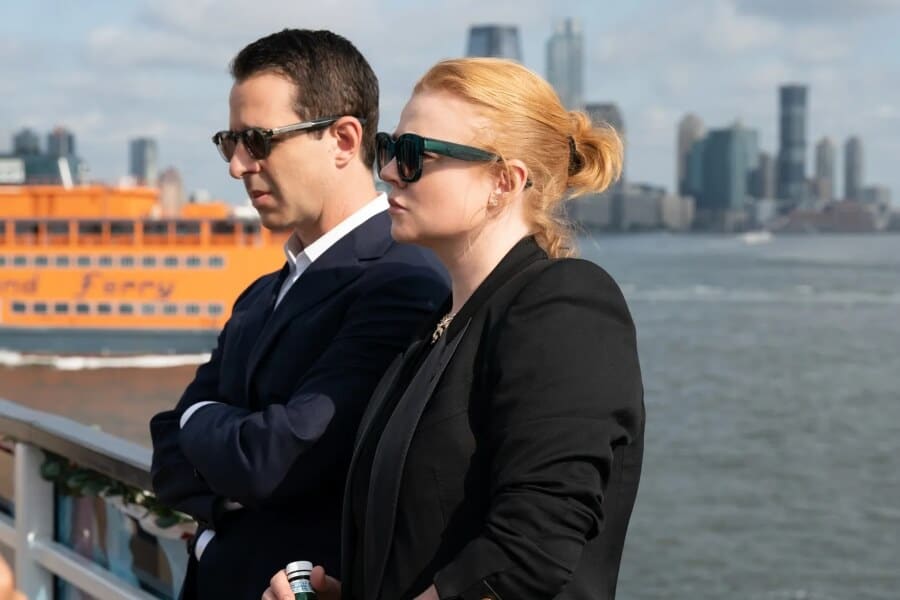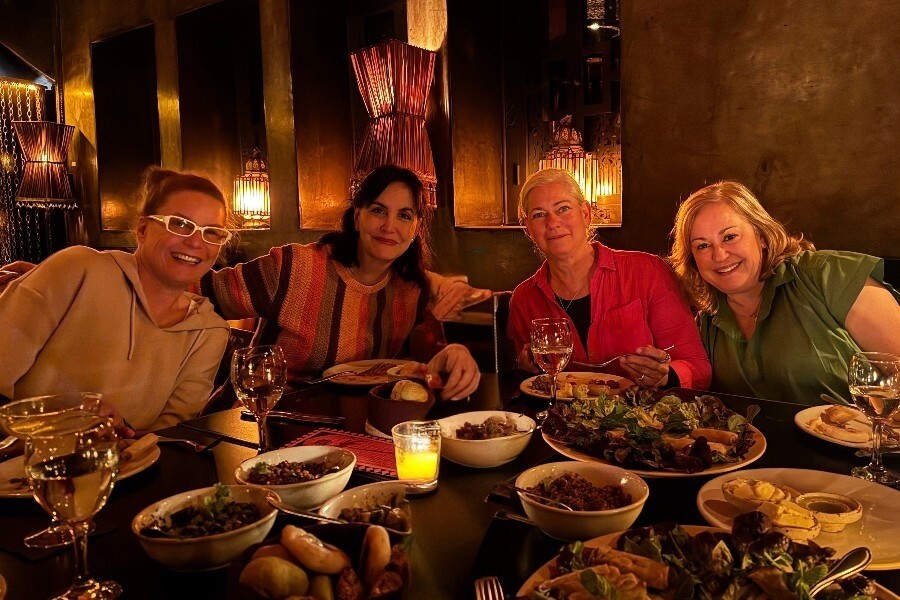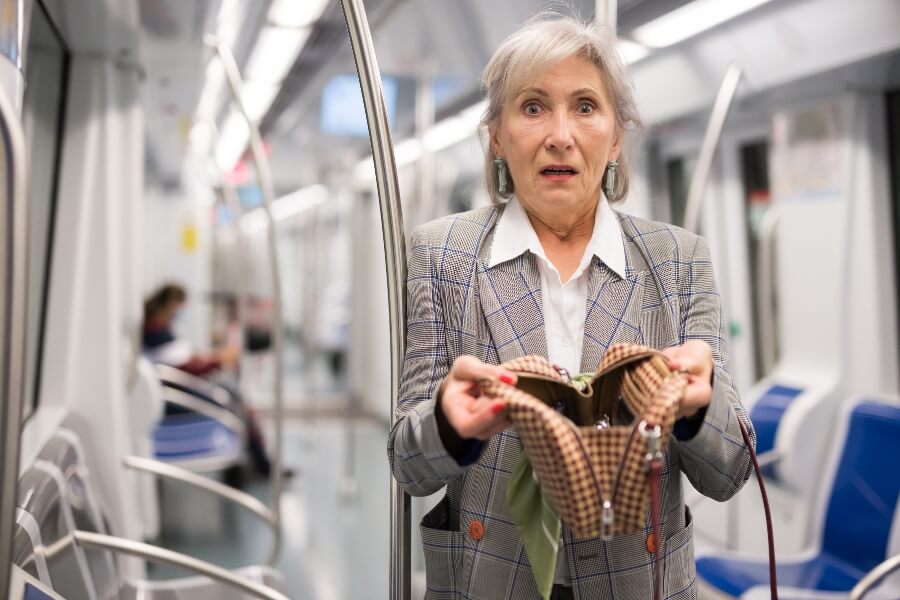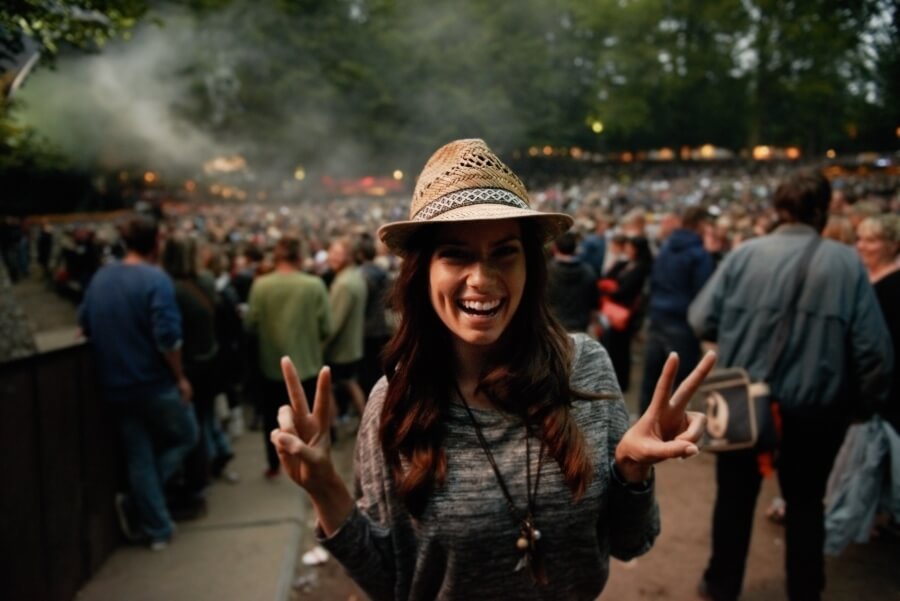Editor’s note: We weren’t planning on running another story about Succession, but after Sunday’s “gut-punch of an episode,” our media critic Barbara Lippert asked us to let her write about the stunning turn in HBO’s family drama that, despite the billions at stake, is relatable for all those from dysfunctional families. Spoilers ahead.
***
Succession recently returned for its fourth and final season. And prior to episode three, which is a flabbergasting cluster bomb of a shake-up of a heartstopper of a shockwave (more on that later), it felt heartwarming to return to TV’s familiar fuckfest.
There was the usual greatness—the acting, writing, editing, music—along with the stunningly vulgar, laugh-out-loud lines. At the end of episode one, for example, Logan was looking fitter than ever. But having grumbled through his 84th birthday party, later in the evening, in bed, he started watching his news channel and the bizarre guy who was the late-night anchor. He called up the head of news and thundered, “Who is this fucking lunk? He looks like a ball sac in a toupee!”
Something this huge is not supposed to happen this early in the season.
But even for worshippers of the show, the tale, told expertly over almost 30 shows in three seasons, was getting repetitive. Sure, things happen: Wives or husbands get disposed of, billions are wasted, the stock craters and comes back, a family party descends into a horror show, and new alliances aimed at undermining big Daddy Logan come together and build big drama, only to fall apart. Logan lashes out at his kids, deflating them, and again takes the lead.
With that circle, the narrative had no real arc, which leads to a kind of stasis in storytelling.
And then came the third, “Connor’s Wedding”—a gut-punch of an episode that came out of nowhere, but in its touching humanity, launched Succession into the pantheon of great television, up there with The Sopranos and Mad Men.
Read More: The One Person in Succession Worth Rooting For (Maybe)
Big Daddy
Even with this insanely perverse, alien billionaire family, the writers found the one authentic thing that unites us to the core as humans, and that everyone can relate to: the sudden, shocking death of the father.
Story-wise, something this huge is not supposed to happen this early in the season, which greatly added to the sense of chaos and disbelief.
And forget the classic family gathered-around-the-death-bed scene. The grubby circumstances of Logan’s death—lying bare-chested on the floor in the narrow hallway outside the “crapper” of his company jet, getting CPR from an unknown flight attendant—were so detached, so unreachable, that no one—not the kids, nor the audience—wanted to believe it.
After all, he’d had several brushes with death. We watched Logan suffer a stroke in the first season, only to make a miracle recovery. “He put on a sock,” the boys told the press when asked about his progress. Roy also had a UTI so serious that it hit him like a bomb in the second season and almost killed him.
But this lying-on-the-floor situation was even more disturbing because there was no one, literally, on terra firma. Having suddenly decided to skip his oldest son Connor’s wedding to rescue his deal with Mattson in Sweden, Logan, who collapsed in the toilet, was getting his chest pounded in a sardine can in the sky. Meanwhile the kids, attending the nuptials, were stuck on an oversized tourist boat in the waterways of New York harbor, with everyone in this disbelieving limbo.
Hope and Prayer
Like the kids, we were all hoping it was a hoax, hoping he was still alive, hoping that there was a way to push death aside. I hated the abuser-bastard, and yet I was in tears, pulling for him, wanting to think good things about him, like that he always showed up.
I hated the abuser-bastard, and yet I was in tears, pulling for him.
And that’s why, “Is he gone?” was a repetitive refrain and resounded, like a chant or a prayer.
The sweeping grief scene, going from one kid to another up in the VIP area of the boat, was shot in real time, 20-something heart-stopping minutes in which the stages of grief and denial were written on their faces and bodies, haunting and palpable.
It felt hard to wrap our heads around the inevitable truth; I can imagine it triggering viewers who’d also lost parents or loved ones without warning. My own dad died suddenly at 64, and I was stricken that I never got to see him and tell him that I loved him before he was gone.
They desperately tried to connect, sea to plane, via cell, which is sometimes how it happens, especially for a contemporary show that conducts half its hard-driving business on the mobile.
But it was upsetting that the conduit was Tom, the husband who betrayed Shiv for his shot with Logan. Still, Tom was trying to be kind, to connect his estranged wife and her siblings with Logan’s body. He put the kids on the phone one by one, “in his ear” to say goodbye for as long as it took. And they had no idea whether he could hear them or whether they were speaking to a ghost.
The Sun and the Sons (and Daughter)
Their father was the sun they orbited, and in trying to come up with something to say over the phone, the adult kids disintegrated. Shiv, hysterically crying, turned into a little girl with a high-pitched voice, begging her daddy, “Don’t go.” Kendall, with his therapy-speak, told him he loved him, that they loved him, but that he wouldn’t forgive him. It absolutely captured the hell of emotionally damaged kids who still fiercely love and cling to their father, despite, (or perhaps because of) the abuse.
Despite all the trappings of money and power, the children—and that’s who they still are—seemed aware of how confoundingly impotent they were.
And Roman bore the additional burden of having a secret that his siblings didn’t know about: He’d had a conversation with his dad the night before, when Logan told him he needed him to come back, and Rome agreed. Now he was despondent, in denial, and full of self-recrimination.
Despite all the trappings of money and power, the children—and that’s who they still are—seemed aware of how confoundingly impotent they were in this ghastly situation.
So, Kendall play-acted in power mode, demanding that his assistant get the “best plane doctors” in the country on a conference call and insisting that he speak to the pilot. He called Frank, Logan’s long time righthand, who was on the plane, and Frank had to tell him, “I can’t. He’s flying the plane, son.”
Loss and Religion
And really, given that everything was tied up with Logan and his business, who wouldn’t feel lost?
Still, there were clues. Logan was in a foul mood at the season’s opener, at his birthday party at his grand new townhouse. He surveyed the scene and his groveling guests and actually registered some disappointment that a high-ranking man of the cloth wasn’t there, though he never mentioned religion before.
No one can really know about the afterlife, Logan decides.
Connor was there, beating the bushes for his absurd Presidential run, but his three younger children were missing, and this seemed to rankle him greatly. Looking around, he said, “Munsters, they’re fucking Munsters,” a reference to the American TV show that I didn’t really get.
Signaling to Colin, his bodyguard and fixer, to join him, he heads out of his own party. They end up at the most effortlessly pedestrian place on the upper-east side—a diner/coffee shop in a small booth surrounded by normal people. With his blue hat, he’s just another customer. And Logan starts getting slightly emotional, telling Colin that he’s his best buddy, his only friend. He feels that he can trust Colin (who is after all, a loyal employee on his payroll). Then Logan starts waxing philosophical about what a man is. Ever the high-flying capitalist, he comes to see man as “an economic unit” and “part of a market,” from whom he feels superior.
Then he ponders death.
He asks Colin if he thinks there’s anything after “all this.”
Colin doesn’t know, but starts to give him an answer, talking about his own dad, who is religious. Then Logan interrupts and talks over him.
No one can really know about the afterlife, Logan decides. And with his black humor, he says: “But I’ve got my suspicions. I’ve got my fucking suspicions.”
A Wedding and a Funeral?
Meanwhile back on the boat, there’s some intercutting between death and the absurdity of Connor’s wedding. Connor’s response to hearing that his dad was dead or dying was a simple, “He never liked me.” He had no interest in speaking to him or being in his ear.
No matter the empire and the billions, it ends this way. No helicopters.
And there is some sweetness to the fact that this sometime farmer ends up marrying Ella, the playwright and former escort, not with “brass bands and bum fights” and the hoopla that could earn him free media, as he dreamed of, but with few close guests and a sweeping kiss. It made the match seem slightly less transactional.
After some corporate rankling, Shiv writes a statement that she reads to the press, while sniffling and calling her father “beloved.” It reminded me of when Ghislaine Maxwell spoke to the press after her press baron father died at sea (having stolen his employees’ pensions), crying at the dock and asking for privacy.
Later, we see the body, wrapped in a simple blue tarp being carried down the stairs of the plane into an ambulance. No matter the empire and the billions, it ends this way. No helicopters.
At Sea and on Edge
Not to overstate the metaphor, but these grown-up kids—Kendall, Shiv, and Roman—are really at sea. They’re also possibly feeling guilty or at least ambivalent about trying to sabotage Logan’s deals, including selling Waystar to Mattson in Sweden, which would have resulted in all of them getting billions. Did it hasten his death? Then they beat their dad for a deal he really wanted for the old-school media empire of the Pierces, and though it hasn’t yet closed, the kids probably agree that they wildly overpaid in the moment. “Congrats on saying the highest number, you morons!” their obviously hurt dad yelled at them over the phone.
What makes it even more haunting is that in the previous episode, the whole family came together for the first time in months at a karaoke place (its own joke) for the aftermath of Connor’s sham bachelor party. Facilitated by his “assistant/friend/advisor” Kerry (Logan’s new gf) and because he wants buy-in on his deals, Logan actually tells his kid that he never apologizes, “but if it means so much to you. ‘Sorry.’”
What hasn’t changed is that they’ll return to what Roman once dubbed, ‘The shit show at the shit factory.’
Having been manipulated so many times, they didn’t buy it. The kids were furious with him and told him they don’t believe him. Shiv called him a “human fucking gaslight.” He took it.
“Look, I just want to get us together,” he said, calmly. “What you kids don’t get is that this is a good deal.” They disagree. Shiv tells him she operates from her “gut.” And Kendall insists that they can get more money out of the Swede.
In this case, Logan’s instincts are right.
Frustrated, he said, “You’re such dopes. I love you, but you are not serious people.”
And with that, the grown-up kids now face a funeral, their failures, and their futures. Have they been written out of the will? Are they broke? Will Marcia, Logan’s possibly still-legal wife who left “to shop in Milan—permanently,” come back into the picture with her son and claim everything?
Now it’s scary. Logan was truly the rock, the nucleus for everything. Without him, will the kids start attacking each other and making new alliances? Will Shiv go back to Tom, who is probably now out of a job? Will the board vote them out and have Logan’s old gang of execs take over? Will cousin Greg, a “bona-fide kid,” as he said, flourish?
Everything is different. But what hasn’t changed is that they’ll return to what Roman once dubbed “The shit show at the shit factory.” It’s so much worse now. And I can’t wait.























0 Comments